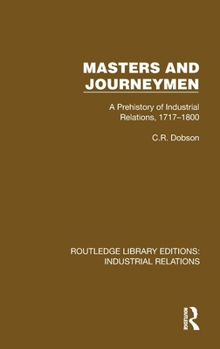Masters and Journeymen: A Prehistory of Industrial Relations, 1717-1800
Select Format
Select Condition 
Book Overview
Masters and Journeymen (1980) examines eighteenth-century trade unionism through nearly four hundred labour disputes in Britain between 1717 and 1800. It uses a series of primary materials - rule books, minutes and written agreements - to identify the elements of an 'industrial relations system' half a century before the Industrial Revolution. There are detailed accounts of several strikes in London and the provinces and much new documentation. The book concludes with a reinterpretation of the role of the state in eighteenth-century labour relations and throws new light on the origins of the Combination Acts.
Format:Hardcover
Language:English
ISBN:1032803487
ISBN13:9781032803487
Release Date:October 2024
Publisher:Routledge
Length:206 Pages
Weight:1.05 lbs.
Dimensions:0.5" x 6.1" x 9.2"
More by C.R. Dobson
Customer Reviews
4 customer ratings | 4 reviews
There are currently no reviews. Be the first to review this work.






















